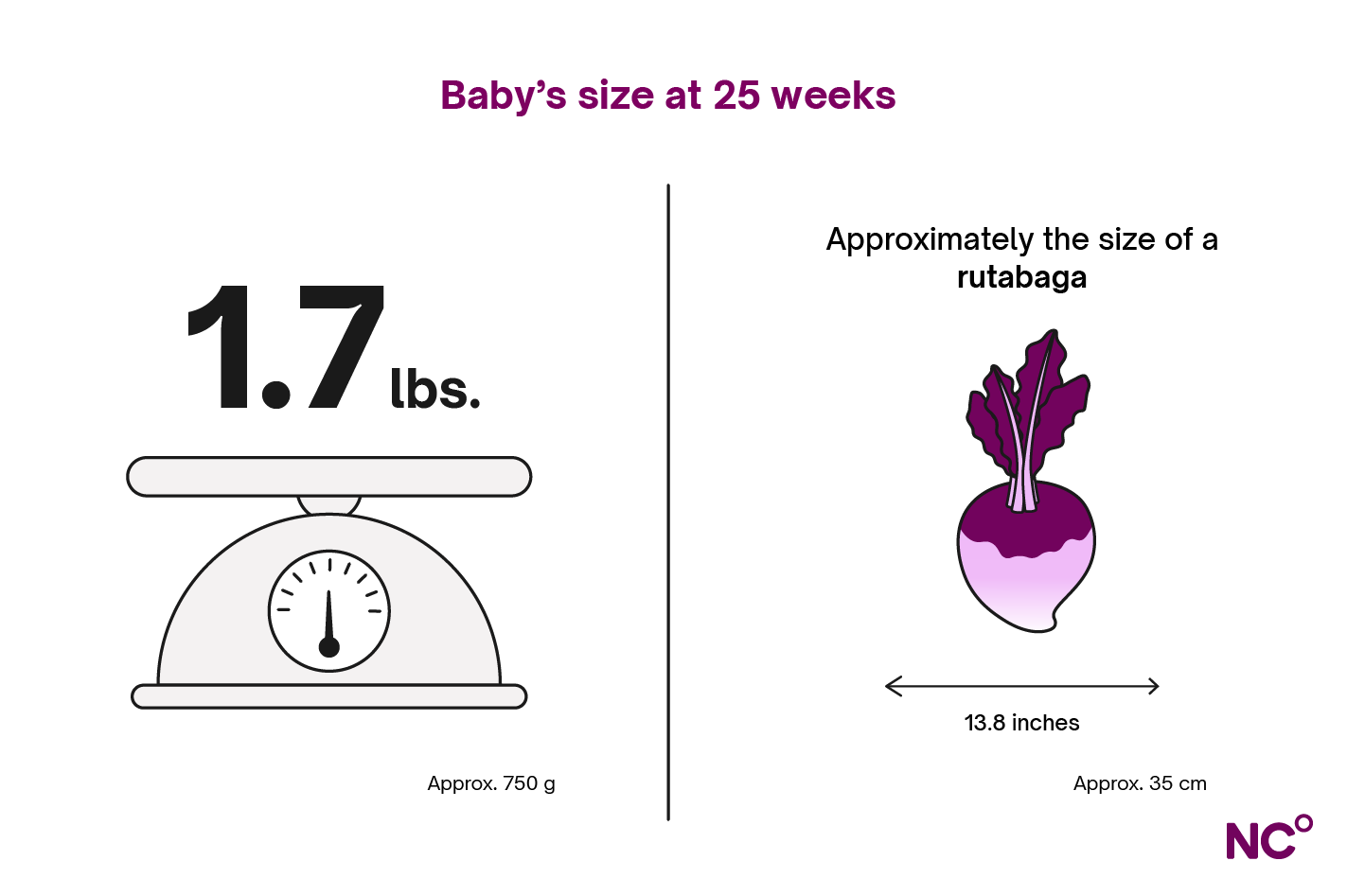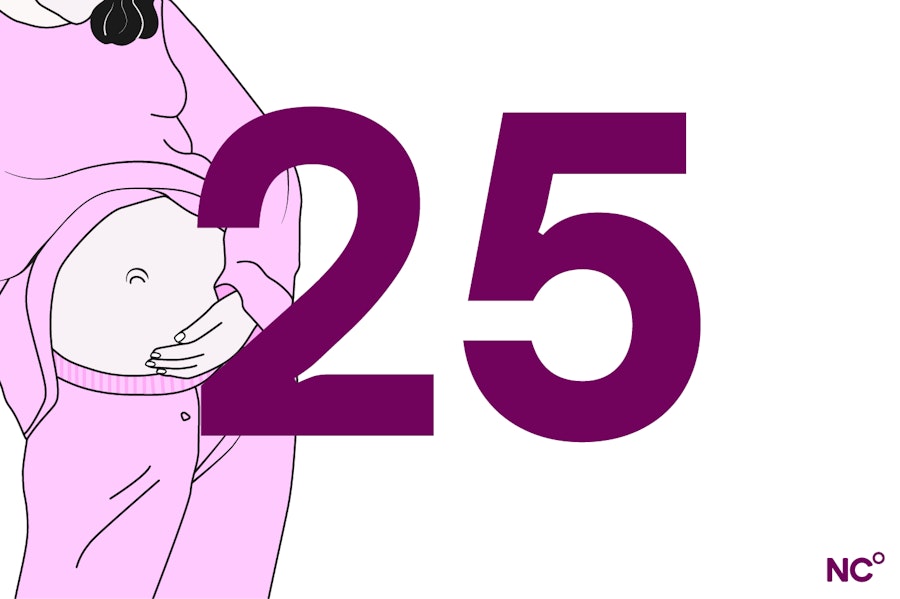25 Weeks pregnant: Symptoms, baby development & tips
Follows NC° Editorial Policy
At Natural Cycles, our mission is to empower you with the knowledge you need to take charge of your health. At Cycle Matters, we create fact-checked, expert-written content that tackles these topics in a compassionate and accessible way. Read more...
Key takeaways:
- Your mental health is as important as your physical health during pregnancy, and it is important to seek professional support for relief if you feel you need it
- Your baby is starting to be able to respond to both physical touch and sound this week, which means you might be able to feel them jump at a loud noise or move when you stroke your stomach
- However well-intentioned, it is completely up to you whether to answer questions or accept advice from others about your pregnancy or postpartum plans
Welcome to week 25 of your pregnancy! As you head into your third trimester in a couple of weeks, you might experience both new and returning pregnancy symptoms as your body continues to grow and change. In this week’s article, we will discuss some physical symptoms like pelvic pain and gas, alongside a common mental health symptom – mood swings. We will also check on your baby and discuss strategies for coping with unsolicited questions and advice on pregnancy and childrearing. Finally, we’ll offer practical tips for things you can do this week to support your health and prepare for your baby’s arrival.
Your body at week 25
Hip and pelvic discomfort
As you approach your third trimester, your baby has grown large enough that you might begin to experience new twinges, aches, pains, or discomforts in your hips, pelvis, and thighs. As your ligaments continue to relax and stretch to support your growing uterus (and baby), this can affect both your mobility and your ability to move around comfortably day-to-day.
Pelvic girdle pain (PGP) or symphysis pubis dysfunction (SPD) are both used to describe symptoms that arise from stiffness or uneven movement of the joints in the pelvis [1]. PGP and SPD are not harmful to your baby and do not normally affect your ability to give birth vaginally, but they can make everyday activities more difficult [2].
If you are experiencing pain in your pelvis, lower back, or thighs, try to rest when possible, wear supportive footwear, keep aware of your posture, and avoid sitting or standing for too long. While certain exercises, even walking, might become more difficult, it is important to try your best to stay active. Incorporating pelvic floor strengthening exercises can help. If you are having difficulty getting relief, talk to your healthcare provider about other treatment options like physiotherapy.
Gas and bloating
The effects of pregnancy on your digestive system can result in constantly changing symptoms throughout the duration of your pregnancy. Gas is one of the most common and refers to the buildup of air and other gases in your digestive tract that are released either by burping or flatulence. During pregnancy, it is believed that rising levels of progesterone relax muscles and lead to the slowing down of your digestive tract. This can increase the time it takes to digest food by up to 30% [3]! This slowdown, combined with the pressure of your growing uterus on your abdominal cavity, can lead to feeling bloated. Your relaxing muscles might also make it more difficult to control the release of gas, leading to flatulence in less-than-ideal times and places.
While preventing gas during pregnancy is nearly impossible, avoiding certain foods and exercising (if recommended during your pregnancy) can help minimize gas buildup. Different foods affect people in different ways, so try to keep track of your diet to investigate whether certain foods are giving you issues. In general, chewing your food well and staying hydrated can both be a big help to your already hard-working digestive system.
Mood swings
As your body undergoes huge physical and emotional changes, it is normal to experience rapid swings in your mood or general feeling throughout the day. Fluctuations in mood can be linked to physical, emotional, and mental stress, as well as fatigue, shifts to your metabolism, and in your hormones levels [4]. While mood swings are most common in the first trimester of pregnancy, they can continue through the second and third trimesters as well as after the baby is born postpartum.
It is important to try and remember that if you are having mood swings, you are not alone, and what you are experiencing is extremely common. Caring for your physical and mental health by eating well, trying to get enough rest, and staying physically active can all help you manage stress and might help. However, if you find that your mood swings are lasting more than two weeks or do not seem to get better, speak with your healthcare provider. During pregnancy, caring for your mental health is as important as caring for your physical health, for both you and your baby.
Your baby’s development at 25 weeks
Important developments to your baby’s neurological and auditory system mean that they can now respond to touch and sound [5]. You might notice that a loud sound or certain music actually makes them jump or kick, which is known as the ‘startle’ response. You might also sometimes feel rhythmic movements in your belly – don’t worry, these are just hiccups!
This week, your baby weighs around 1.5 to 1.7 pounds (660 to 750 grams and measures around 13 to 13.8 inches (33 to 35 centimeters) [6]. This is around the size of a turnip, or rutabaga.

Managing unsolicited advice
Your bump might become more noticeable to those around you, and there are pros and cons to others realizing you are pregnant. On the plus side, you might be offered that last seat on public transport during rush hour! On the other hand, you might be surprised at how many people – sometimes perfect strangers – are willing to ask you personal questions or offer unsolicited advice.
In the 22 weeks pregnant guide, we talked about how to deal with those invading your physical space, also known as uninvited tummy touchers. But what about your mental or emotional space? You might be surprised to find out that some around you are unashamed to ask you personal questions about your fertility journey or birth plans, and are eager to offer unsolicited advice on everything from breastfeeding to raising your unborn baby.
When it comes to questions, you are entitled to answer or not answer with as much or as little detail as you want. Even if these questions are coming from a close family member or friend. If you feel comfortable, you have questions, or you are genuinely interested in another person’s opinion, questions can lead to conversations that can be nurturing and helpful. But it is also OK to feel uncomfortable, or to want to avoid discussing these topics. A simple “I don’t know right now” or “I don’t really feel comfortable talking about it” are firm but respectful ways of signaling your boundaries to others.
Unsolicited advice is sometimes harder to avoid, but it is up to you (and your partner) to decide where and from whom to take advice. You can, and should, ignore any advice that you aren’t interested in receiving or which you disagree with based on your own knowledge or what you have been advised by your medical team. However well-intentioned, it is not rude to respond quickly and briefly with “thanks for the tip” or “I appreciate the advice” and leave it there, no further explanation or expounding needed. If listening to the advice or experiences of others, particularly concerning childbirth or breastfeeding, make you stressed or anxious, you are allowed to remove yourself from those situations as quickly as possible.
Finally, you can find support from those around you. If certain topics make you stressed or you just don’t want to talk about them, let those around you, like your partner or trusted friends, know. They can help have your back in social or public situations. Venting to trusted friends and family can also help you relieve stress and anxiety while strengthening the support of those around you.
Tips in week 25
- Continuing exercise during pregnancy: It is normal that during your pregnancy, you might find that certain exercise or types of exercise are no longer possible or comfortable because of your changing body. If you find you are getting exhausted, out of breath, or experiencing pain or discomfort of any kind, it might be time to modify your routine or find a new physical activity. Talk to your nurse, midwife, or doctor for advice on continuing exercise safely.
- Think about where your baby will sleep: Current guidelines suggest sharing a room with your baby for the first 6 months of their life [7]. This means the baby is in the same room as you, but in their own separate and safe sleeping space. Room sharing makes feeding, comforting, and monitoring your baby easier [8]. Depending on your living situation, this might mean reconfiguring furniture and talking with a partner on how you plan to tackle nights. By six months, some babies may be able to sleep for 8 hours or longer at night, but every baby is different, and it can take up to a year or more before they will consistently sleep through the night [9].
- Keep up-to-date with vaccines: Check to make sure you’re up to date with flu, Tdap (tetanus-diphtheria-acellular pertussis), RSV, and COVID-19 vaccines. If you have any questions about your vaccine status, contact your nurse, midwife, or doctor. Getting vaccinated while pregnant helps create antibodies that you can pass to your baby to help protect them from disease in their first few months of life, and most vaccines are considered safe for use during pregnancy [10].
- Antenatal classes: There are a variety of classes you can take during pregnancy that can help you prepare for your baby’s birth and give you information that can help you feel more confident caring for your newborn. Depending on where you live, many are free to attend. You can find antenatal classes by contacting your nurse or midwife or the children’s or family health center in your area.
Supporting your health with Natural Cycles
Finding support for your mental and physical health during pregnancy is important. NC° Follow Pregnancy is there to equip you with the information you need from conception through postpartum. Track your symptoms in the app and access weekly guides detailing the progress of your pregnancy. Interested in learning more – why not check out Natural Cycles today?
Did you enjoy reading this article?
